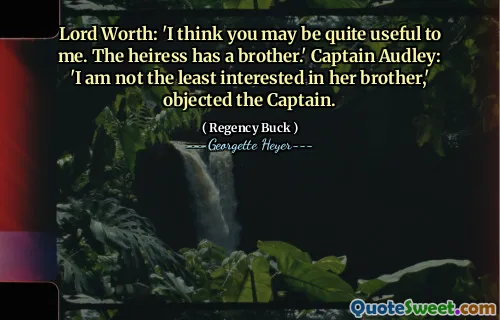
Lord Worth: 'I think you may be quite useful to me. The heiress has a brother.' Captain Audley: 'I am not the least interested in her brother,' objected the Captain.
This exchange between Lord Worth and Captain Audley exemplifies the nuances of social and romantic interactions during the Regency era, as depicted in Georgette Heyer's novel. Lord Worth’s remark reveals a strategic or possibly mischievous approach to relationships, hinting at the importance of alliances, familial ties, and social advantage. His comment that the heiress's brother may be useful suggests a worldly perspective, where marriage and connections often serve practical purposes beyond mere affection. Conversely, Captain Audley’s response signifies a more detached stance, emphasizing personal interest over social or material gain. This dialog underscores the contrasting values and attitudes of characters within the story—some motivated by social cunning, others by personal inclinations. Reading this snippet also allows us to appreciate Heyer's sharp wit and keen observation of human nature, emphasizing how appearances and social roles influence interactions. It reminds us that, historically, marriages and alliances were often strategic moves, motivated by considerations beyond love, a theme still relevant today. Furthermore, the subtle power play exemplified here—where one character seeks influence or advantage and the other firmly resists—mirrors broader societal dynamics. The dialogue captures the essence of Regency society’s emphasis on social maneuvering, often cloaked in civility but laden with underlying intentions. Through their words, Heyer recreates a vivid picture of a world where personal choice and societal expectation frequently clashed, offering us a lens into the complexities of human relationships in a bygone era.






